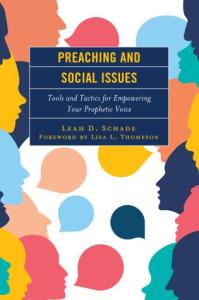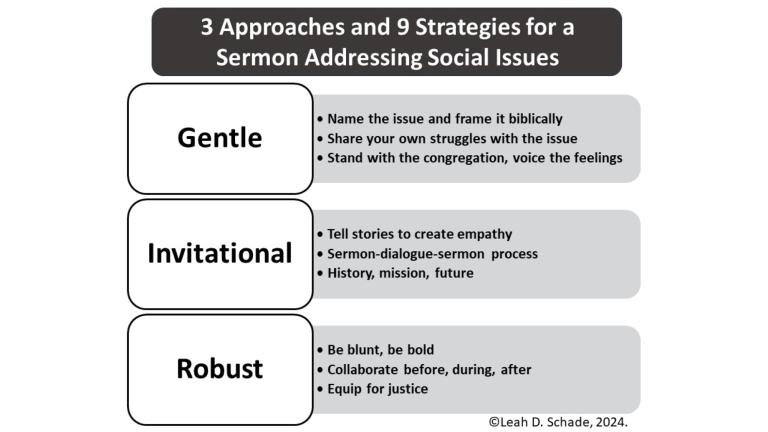As the U.S. is in full swing with the 2024 election season, here are preaching ideas for the Sundays leading up to Nov. 5th based on the Gospel readings from the Revised Common Lectionary.

Before we look at the biblical texts for Oct. 6 and 13 in the lead up to the 2024 election, we have to first address an important question.
Is it okay for preachers to mention the election in sermons?
Some will argue that the separation of church and state means that preachers cannot speak about the election in their sermons. However, this is not true. Preachers may speak about the themes and issues surrounding an election so long as they do not endorse a candidate. In fact, many parishioners actually want their ministers to provide biblical, theological, and ethical guidance for thinking about social issues that affect their lives, families, and communities.

In my previous article, I explained the do’s and don’ts of what clergy and congregations can say and do when it comes to politics. Remember that the biblical writers addressed the social and political issues of their day because God cares about the flourishing of all people. This means that not only is it acceptable for preachers to talk about the election, it’s a moral and ethical responsibility for them to connect the Bible and theology to the issues that matter today, especially when it comes time for people to exercise their right to vote.
However, the way in which a preacher talks about the election in their sermons also matters.
So before looking at the biblical texts for the 2024 election season, I’ll share a framework I developed for my book Preaching and Social Issues: Tools and Tactics for Empowering Your Prophetic Voice to help ministers choose which path works best for them and their context.
Assessment Tool for preaching and social issues
I developed an Assessment Tool for preaching and social issues which you can take here. This tool will help you think about your approaches to preaching and social issues using a three-dimensional questionnaire that measures: (1) your own vulnerabilities and strengths, (2) the characteristics of the congregation you serve, and (3) the quality of relationships within the congregation and between the congregation and yourself.
Gentle, Invitational, and Robust Approaches
Based on your score from the Assessment Tool, you’ll see I suggest three approaches to a sermon addressing a social issue: Gentle, Invitational, and Robust.
- The Gentle approach is for clergy who are in situations where there may be personal or congregational stress, the congregation is new to sermons addressing social issues, or there is vulnerability on the part of the preacher.
- The Invitational approach is recommended for congregations that are ready for a more challenging message by way of dialogue and building bridges of listening, empathy, and understanding.
- The Robust approach is for clergy and congregations who are ready to be fully engaged in public theology and to put their faith into action on social issues.
I suggest three strategies for each, for a total of nine in all. You can read about these approaches in my book. In the meantime, here’s a graphic with a quick summary:

As I go through each of the Gospel texts assigned for the Sundays in the 2024 election season, I’ll suggest sermon ideas for each of the Gentle, Invitational, and Robust approaches.
This is the first installment covering Oct. 6 and 13. In the next installment, we’ll look at the texts for Oct. 20 and 27. The final installment will be for Nov. 3, the Sunday before the election.
Oct. 6, 2024
Twentieth Sunday after Pentecost: Mark 10:2-16
Exegetical summary
Chapter 10 in the Gospel of Mark is the hinge between Jesus’s first three years of ministry and his last week, which is detailed in Chapters 11-16. The beginning of the chapter finds Jesus back in the Judean wilderness where his ministry began. Challenged by the religious teachers about the law concerning divorce, and then by disciples turning away children who had come for a blessing, Jesus rebukes patriarchal tradition in favor of God’s grace. In God’s kingdom, women and children have worth and value, regardless of the laws and opinions of adult men.
Connections to election issues
In the 2024 election, there are numerous issues regarding women’s freedom, value, and worth in terms of voting rights, bodily autonomy, access to healthcare, and marriage status. Marriage equality for LGBTQIA+ folks are also being questioned. In addition, the safety and wellbeing of children are at stake in terms of policies around guns, book bans, and transgender youth.
In any sermon approach, the preacher will need to explain that in ancient Jewish society, only the husband had the authority to decide on divorce. As well, men at that time had determined that children had no status and, therefore, no need for consideration. Overall, Jesus’s concern was for those who were vulnerable and had little say over their personhood and agency in society.
Gentle
Name the issue, frame it biblically. The sermon can name the issues around women and children and note that the Bible also had concerns about their acceptance, value, and worth. While we may be uncomfortable talking about these “political” topics in church, the fact that Jesus had teachings about these vulnerable groups opens the door for congregations to think biblically, theologically, and ethically about these issues.
Such a sermon could ask what it would be like for the church to listen to the stories of women, LGBTQIA+ folks, and children while affirming that God seeks the welfare and equal treatment of all people, regardless of gender, sexual orientation, or age.
Invitational
Tell stories to create empathy. Invite people who are married, divorced, single, and widowed to a discussion about this passage. This includes people who are gay, straight, and intentionally celibate. After giving them the historical context of the story, invite them to share their thoughts and responses to Jesus’s teaching, specifically from their perspective.
If they are willing, ask them to also reflect on the implications of this passage in relation to issues of gender, marital status, same-sex marriage rights, and women’s rights. With their permission, share their different viewpoints, insights, and questions in the sermon. Affirm that your congregation, following the teachings of Jesus, is one that welcomes and affirms people in all walks of life.
Robust
Be blunt, be bold. In this sermon, the preacher could begin by highlighting aspects of Project 2025, the conservative plan for a Republican administration that would limit women’s and LGBTQIA rights. The plan contains policies that would enforce traditional gender roles, restrict reproductive rights, and reduce government oversight in protecting against discrimination and inequality.
The preacher could then explain the Mark 10:2-16 passage and how Jesus’s teachings counter the heteronormative patriarchal worldview that underlies the conservative vision for America. The sermon can conclude by sharing a vision of equality, equity, and flourishing for all people based on Jesus’s teachings about the kingdom of God.

Oct. 13, 2024
Twenty-first Sunday after Pentecost: Mark 10:17-31
Exegetical summary
The rich young man in this story has followed all of God’s commandments, yet his wealth keeps him from experiencing the fullness of community and God’s grace. Likely, his privilege insulates him from the difficulties of those who do not enjoy the protections of financial prosperity. Jesus invites the man to divest of his fortune and find a deeper, richer, and more meaningful life.
The fact that the disciples are “perplexed” by Jesus’s teaching that the rich will have difficulty entering God’s kingdom indicates the commonly held assumption that wealth opens the door to heaven before all others. Yet, Jesus does not condemn the wealthy with finality. It is possible for God to change their hearts, habits, and hoarding of resources so that they can receive the blessings that money cannot buy.
Connections to election issues
In the 2024 election, issues around money, distribution of resources, and the fairness of the U.S. economic system are critical. As citizens consider the policies of candidates seeking elected office, it is important to consider their past and present policy positions on taxes, wages, healthcare costs, inflation and cost of living, Social Security, and climate and energy costs.
Any sermon on this text will need to wrestle with what Jesus means when he says, “Many who are first will be last, and the last will be first” (Mk. 10:31). The implications of this teaching are far-reaching for Christians who consider how they will vote in the 2024 election. But a congregation’s response to such a sermon will depend on the degree to which they identify with the rich man and his ethical and spiritual conundrum.
Gentle
Share your own struggles with the issue. This approach would work best in a church where the preacher and congregants are financially secure and have not experienced the realities of surviving in a low-wage or impoverished situation. The preacher can model what it’s like to identify with the rich man. You might say something such as, “Despite my belief that I am a “good person,” I would likely go away ‘shocked and grieving’ because of my inability and unwillingness to relinquish my financial security.”
Yet, the preacher could wonder aloud what it might be like if Congress raised the minimum wage and required the wealthy to return to a tax rate that is more equitable. As a person with privilege, what would you lose? What would you gain? The congregation could vicariously participate in this struggle alongside the preacher, asking these same questions of themselves.
The sermon could conclude by imagining what might be possible if they unburdened their camel, so to speak, while trusting God to open the aperture of the needle just a bit wider.
Invitational
Sermon-dialogue-sermon. In the sermon-dialogue-sermon process, the first sermon would explain how the problem of debt is like a humungous burden on a camel’s back. Our individual and national debt is so high, the camel couldn’t even pass under an arched bridge, let alone through the eye of a needle.
The preacher could then invite the congregation to a deliberative dialogue on debt using the National Issues Forum Institute’s nonpartisan issue guide, ”A Nation in Debt: How Can We Pay the Bills,” following the sermon that day or during the week. The group would discuss the guide’s options of enacting austerity measures, adjusting tax rates, or reducing the size of the government. Then the minister could preach a follow-up sermon for one of the subsequent weeks before the election drawing on the insights from the discussion and reflecting biblically and theologically on the implications for how Christians vote.
Robust
Equip for justice: This sermon would be for a congregation that understands what it is like to live in a financially precarious situation either because of personal experience or because their mission and outreach work has opened their eyes to the realities of the systems that create poverty. The preacher could note that nothing changes with the rich young man. His heart towards the poor does not soften, and his wealth remains intact.
But this does not mean that Christians must accept this ending to the story. Jesus’s teaching urges us to push back against unfair financial and economic policies that protect the wealthy while the poor suffer. The sermon could suggest various ways that Christians can align themselves with God who is making the impossible become possible. These can include voting for candidates who are committed to financial equity, joining in interfaith campaigns for divesting of fossil fuels, and supporting efforts to end predatory practices such as payday lending.
What are your sermon ideas?
In the comments, share your suggestions for sermons about the texts for October 6 and 13. What is your preaching context, and what do you think would work well in your congregation?
With faithful study, listening, and discernment, preachers can provide biblical insights, theological perspectives, and ethical direction throughout the 2024 election season.
Read also:
What Clergy Can Say (and Not Say) During the Election Season
Preaching 2024 Election – How will Clergy Navigate Issues?
Ideas for Clergy Dealing with Pre-Election Stress

The Rev. Dr. Leah D. Schade is the Associate Professor of Preaching and Worship at Lexington Theological Seminary in Kentucky and ordained in the ELCA. Dr. Schade does not speak for LTS or the ELCA; her opinions are her own. She is the author of Preaching and Social Issues: Tools and Tactics for Empowering Your Prophetic Voice (Rowman & Littlefield, 2024), Preaching in the Purple Zone: Ministry in the Red-Blue Divide (Rowman & Littlefield, 2019) and Creation-Crisis Preaching: Ecology, Theology, and the Pulpit (Chalice Press, 2015). She is the co-editor of Rooted and Rising: Voices of Courage in a Time of Climate Crisis (Rowman & Littlefield, 2019). Her newest book is Introduction to Preaching: Scripture, Theology, and Sermon Preparation, co-authored with Jerry L. Sumney and Emily Askew (Rowman & Littlefield, 2023).













